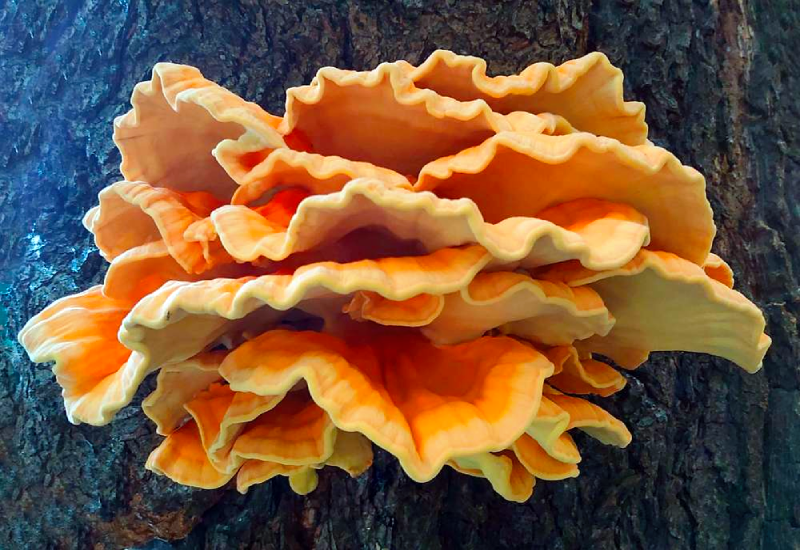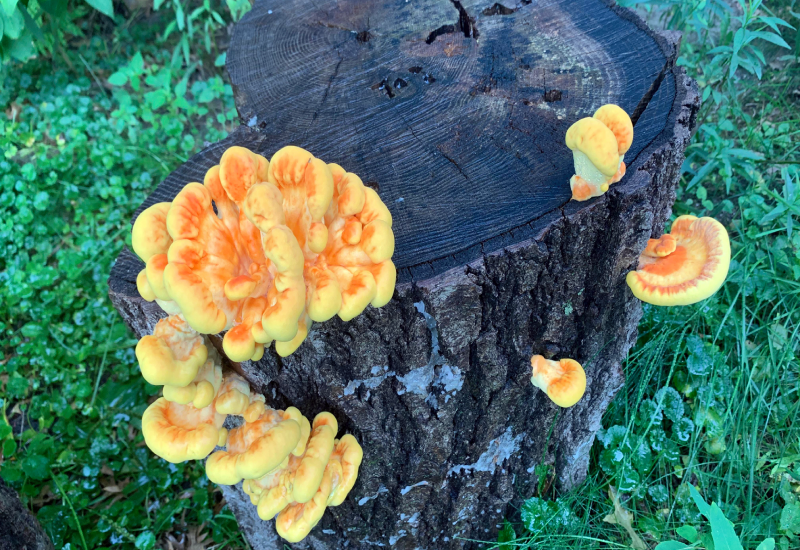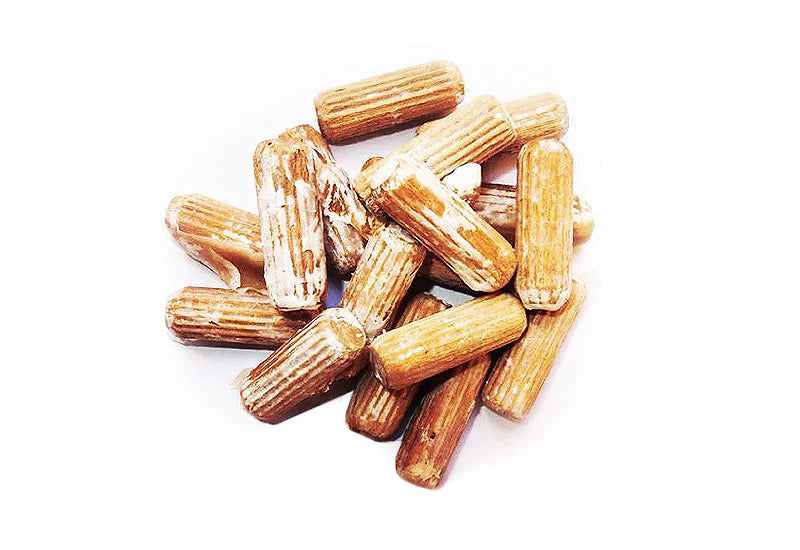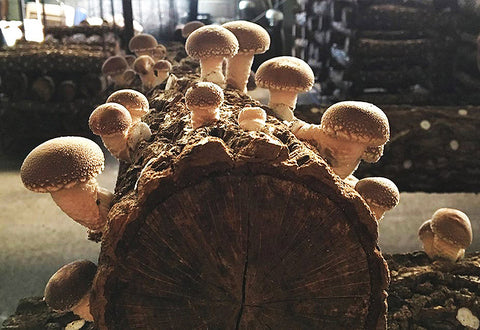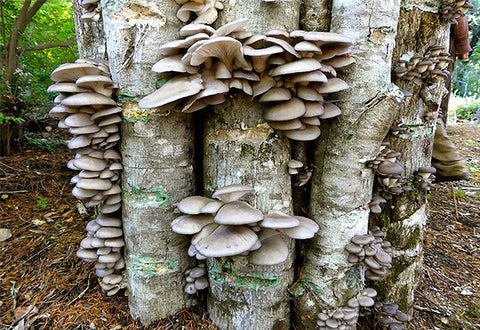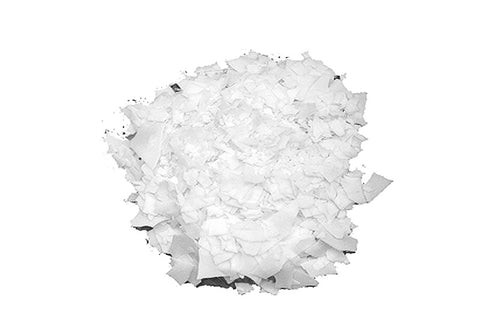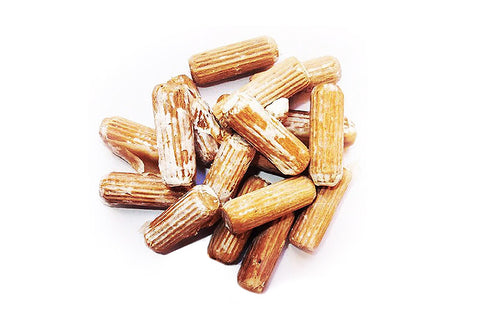Chicken of the Woods - Mycelium on organic wood dowels
- 🍄 MYCELIUM ON DOWELS – CHICKEN OF THE WOODS: Laetiporus sulphureus (sulfur polypore), ideal on hardwood: oak, chestnut, willow, poplar, wild cherry/cherry, beech.
- 🌱 GUIDED CULTIVATION: Drill, insert the dowels, then seal the holes (wax recommended). "Totem" method or classic logs. A drill and an appropriate wood bit are sufficient.
- 🌳 ADAPTABILITY TO SPECIES: Prefers oak and chestnut; also fruits on willow, poplar, wild cherry, and beech. Avoid conifers (especially yew).
- 🍽️ FLAVOR & NUTRIENTS: Firm and fibrous texture, flavor reminiscent of chicken; rich in fiber and beta-glucans, excellent for sautéing or breading.
- 🌍 ORGANIC PRODUCTION: Certified "BE-BIO-01", grown without pesticides or GMOs, environmentally friendly.
- 📏 PRACTICAL DETAILS: ~50 dowels per log of 100 cm × 20 cm. Storage: ~3 months in the refrigerator (2–6 °C) before use.
-
2-3 weeks. If in stock, we will send them to you within a week. Consult all our deadlines
Laetiporus sulphureus, also called Chicken of the Woods, Sulfur Polypore or wood chicken, is a spectacular mushroom that forms large overlapping shelves in sulfur yellow to orange.
It mainly grows on oak (living or dead), but also on willow, cherry, chestnut, poplar, where it causes brown rot. It is mainly found from late spring to autumn.
Characteristics
-
Culinary excellence (young): firm and fibrous flesh, “chicken” texture and mild slightly lemony flavor.
-
Morphology: rosette shelves of 5 to 25 cm (sometimes much larger) with pale wavy edges; underside with fine pores (no gills) lemon yellow.
-
Ideal age: favor young, tender and juicy edges; with age, the flesh becomes tough and less pleasant.
-
Cooking: excellent sautéed, breaded or in stew. Always cook well (never raw); young pieces are suitable for blanching and freezing.
Precautions
-
Do not consume specimens growing on yew (Taxus baccata) or other conifers.
-
Possible digestive intolerance in some people: start with a small well-cooked portion.
For more information, we recommend reading our guide: "Log Cultivation"
Use fresh logs of oak, chestnut, cherry, wild cherry, willow or poplar (Ø 15–25 cm, 80–100 cm). Inoculate quickly, wax the entry points, then incubate in shade and humidity. Allow 12 to 24 months before the first fruiting, usually spring/autumn, with irregular but sometimes spectacular yields.
How to inoculate logs with mycelium on wooden dowels?
Necessary Equipment
- Log or recently cut wood block (max 3 months). Avoid resinous woods. Most hardwoods are suitable. Contact us if you want more specific information. Log diameter: between 10 and 25 cm. Length: between 50 and 150 cm.
- Mycelium on dowels: For a length of 1 m, multiply the diameter of a log by 2.5. Example: a 1 m long and 20 cm wide log requires 20 x 2.5 = 50 dowels.
- Drill and 8-9 mm drill bit
- Hammer
- Optional: vegetable wax, beeswax, paraffin or green clay to cover the holes.
Instructions
- Wash your hands before touching the mycelium to maximize success chances.
- Make holes in your log. The holes should be slightly deeper than the height of the dowel. Space the holes about 10 cm apart. A 1 m long log requires about 50 dowels.
- Insert the dowels into the holes using a hammer. The dowels should not protrude from the hole.
- Cover with wax. The wax protects the mycelium from insects and diseases as well as drying out. Alternatively, you can also use paraffin, cheese wax, or green clay.

- Be patient: Place your logs in a shaded place sheltered from winds. Avoid direct contact with the ground which could bring small insects and contamination. You can, for example, place them on a pallet covered with a tarp. In case of heat, occasionally pour a watering can of water on the logs to prevent them from drying out.
- Harvest and enjoy your production. A log made under good conditions can produce mushrooms for 3 to 5 years.
For more information, we recommend reading our guide: "Log Cultivation"
Remarks
The optimal periods to inoculate logs are autumn, winter, and early spring, before the sap rises.
The main enemy of this cultivation is dryness: cover the wood with a tarp or veil if necessary to maintain the moisture of the logs, especially during incubation.
We prepare our bags by weight, so there may be slight variations from the indicated number.
We inoculate the dowels with a mixture of grains and wood shavings. It is therefore normal to have some sawdust mixed with the dowels. This remaining sawdust can also be used as inoculum.
Our quality commitment:


